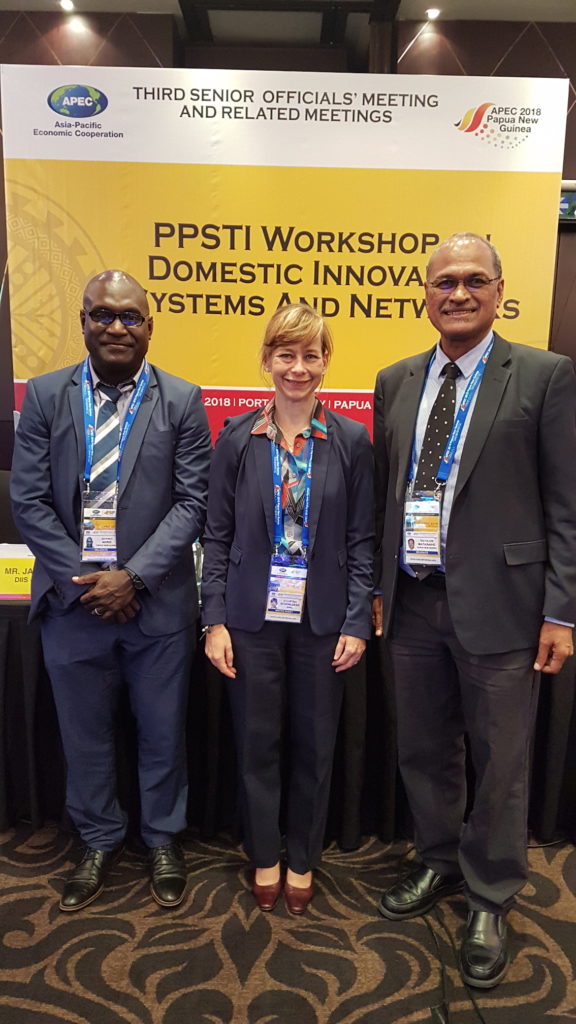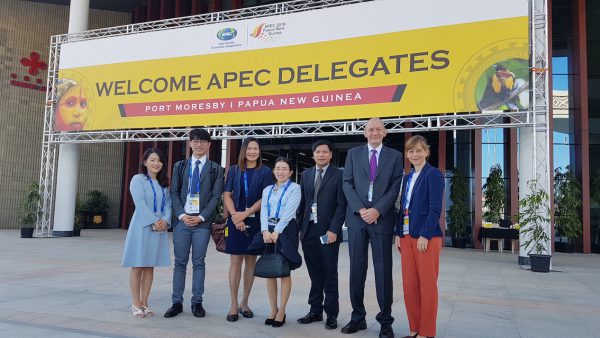Real Solutions Are Found in Innovation and Collaboration
As part of the Third APEC Senior Official’s Meeting (SOM3), held in Port Moresby, Papua New Guinea in August, APRU provided insights and recommendations regarding the development of Innovation Networks and contributed to the discourse on policy needs to support healthy aging at a series of Policy Partnership on Science, Technology, and Innovation (PPSTI) workshops and discussions.
Christina Schönleber, APRU Director of Policy and Programs, gave a keynote address on the principles for establishing and maintaining productive innovation networks as part of the Workshop on Domestic Innovation Systems and Networks. Government research and development structures, innovation funding, and institutional frameworks for innovation networks were themes of the event. The workshop, organised by the Papua New Guinea Science and Technology Council & Secretariat, showcased best practices in the APEC region on how to create and grow scientific and technology production and enhance domestic capacity with the aim to inform the development of an APEC Manual on Domestic Innovation Systems and Networks.

Using APRU as an example, Schönleber emphasized the importance of transdisciplinary collaboration, external industry engagement, and research partnerships in not only domestic innovation systems and networks, but also the establishment and maintenance of a cross-border resource-sharing community. She highlighted that “this capacity provides APRU with the ability to initiative impactful collaborations and projects that tap into latest scientific knowledge enabling policy foresight to initiate creative solutions to the Asia-Pacific region’s challenges”.
The following PPSTI policy sharing roundtable discussion explored policy needs to support viable innovation, facilitating resilient living and healthy aging. Schönleber presented findings from the collaboration with the Asian Development Bank, exploring the potential of new technologies to maintain and enhance productivity by extending the productive working life of an aging workforce and better equipping a young workforce for future work to contribute greatly to higher economic growth. The policy dialogue provided valuable insights to shape the APEC 2018 Leaders Statement.

While in Port Moresby, Schönleber also presented to APEC delegates at the 12thAPEC PPSTI Meeting a preview of APRU’s 2018 Impact Report “Amplifying Impact: Transformative Solutions to Asia-Pacific Challenges.”

Built on the first report in 2016, the 2018 Impact Report demonstrates various models of cooperation that actively inform policy and practice that encourages partnership and innovation. The report reflects the positive impact of bringing together the social sciences and humanities with science and technology disciplines to address global challenges. Additionally, it demonstrates the necessity of doing so if real solutions are to be found that are tailored to a wide diversity of contexts, which further exemplifies APRU’s commitment to interdisciplinary interaction and building an innovative network rooted in partnership, collaboration and industry engagement.
According to the BBC, Papua New Guinea is one of the world’s most linguistically diverse countries with 80% of its population living in a non-monetarized economy.
As a guest member of APEC Working Groups, APRU is a regular participant in a number of its high-level discussions with the objective to ensure universities have a voice in shaping policies across the Asia-Pacific.
The PPSTI working group brings together experts in higher education, business, and policy to serve as a forum, in which the best minds within the APEC region convene to share innovative ideas and discuss matters of interest in science and technology.
Download the APRU 2018 Impact Report “Amplifying Impact: Transformative Solutions to Asia-Pacific Challenges: http://apru.org/resource/2018-impact-report-transformative-solutions-to-asia-pacific-challenges/
